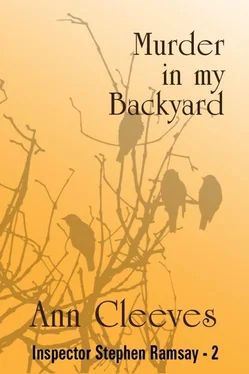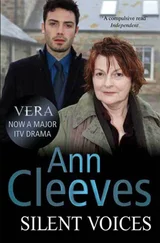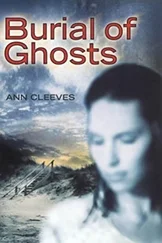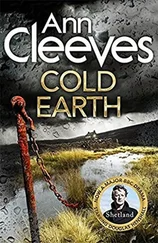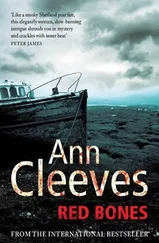Ann Cleeves - Murder in My Backyard
Здесь есть возможность читать онлайн «Ann Cleeves - Murder in My Backyard» весь текст электронной книги совершенно бесплатно (целиком полную версию без сокращений). В некоторых случаях можно слушать аудио, скачать через торрент в формате fb2 и присутствует краткое содержание. Жанр: Детектив, на английском языке. Описание произведения, (предисловие) а так же отзывы посетителей доступны на портале библиотеки ЛибКат.
- Название:Murder in My Backyard
- Автор:
- Жанр:
- Год:неизвестен
- ISBN:нет данных
- Рейтинг книги:5 / 5. Голосов: 1
-
Избранное:Добавить в избранное
- Отзывы:
-
Ваша оценка:
- 100
- 1
- 2
- 3
- 4
- 5
Murder in My Backyard: краткое содержание, описание и аннотация
Предлагаем к чтению аннотацию, описание, краткое содержание или предисловие (зависит от того, что написал сам автор книги «Murder in My Backyard»). Если вы не нашли необходимую информацию о книге — напишите в комментариях, мы постараемся отыскать её.
Murder in My Backyard — читать онлайн бесплатно полную книгу (весь текст) целиком
Ниже представлен текст книги, разбитый по страницам. Система сохранения места последней прочитанной страницы, позволяет с удобством читать онлайн бесплатно книгу «Murder in My Backyard», без необходимости каждый раз заново искать на чём Вы остановились. Поставьте закладку, и сможете в любой момент перейти на страницу, на которой закончили чтение.
Интервал:
Закладка:
Everyone in the hall was staring at her. She felt hot and angry.
“No,” she said. “Not at all. I wanted to explain. I’m on your side.”
But he would not listen.
“A development in the heart of the village, home for a couple of dozen yuppies. I suppose you think that’s just fine.”
“You don’t understand,” she said. “I’m on your side.”
He seemed to hear her for the first time.
“How’s that then, Mrs. Parry?” he said, still playing to the audience. “ You’re the one that sold the field behind the Tower to Henshaw. He couldn’t build all those fancy houses on it without you.”
“Away man, Charlie!” Fred Elliot called from the stage. “ This is no way to run a meeting. Give Mrs. Parry a chance.”
“Go on then,” Charlie said sulkily, nodding towards the stage. “You wanted to explain. Go up there and tell us all about it.”
She walked to the front of the hall, her sense of outrage at the position Henshaw had put her in getting her through the awkwardness. She stood on the stage beside Fred. As she spoke she was acutely aware of her southern, middle-class accent. It’s not my fault, she wanted to say. I was born in Northumberland, too. I didn’t ask to be sent away to school.
“It’s true that I sold the land to Henshaw,” she said. “But he misled me about the sort of development he was planning for the Tower field. I suppose I was foolish to trust him, but he showed me professionally drawn-up plans. He said there would be twenty small, reasonably priced houses for local families and six retirement bungalows. I talked to members of the parish council and they approved of the idea…”
She faltered. A strand of white hair had become unpinned from her untidy roll at the back of her head. She felt old and self-conscious.
“That’s a bloody big field for twenty-six little houses,” Charlie shouted from the back of the hall. “What did he tell you he was going to do with the rest of the land?”
Mrs. Parry blushed. “I know it sounds naïve,” she said, “but he told me he was planning a children’s play area and football field. I believed him.” She looked round the hall. “ I sold the land for well below the market price,” she said helplessly, “ because I wanted to do something to help the village. I’ve been so happy here. I’m sorry. Really. I’m sorry.”
There was a sympathetic silence, but Charlie shouted: “ It’s all very well being sorry, isn’t it, but that won’t stop Colin Henshaw from building eighty executive detached dwellings, each with a double garage.” He sneered as he quoted the exact wording on the planning application. “We’ll be outnumbered. There’ll be more incomers than there are of us. Of course, you’re an incomer, so maybe you’ll feel at home with them.”
“Charlie!” Fred Elliot said sharply. He turned apologetically to Alice Parry. “Go on, pet,” he said.
“The planning inspector has approved Henshaw’s plans,” she said, “ but the council still has time to appeal against the inspector’s decision. That’s why I’m here. We must persuade the council to fight the case in the high court. I want to support your campaign. I don’t want Brinkbonnie ruined any more than you do, and I’ll fight to protect it.”
She sat down to a spasmodic burst of applause and to more jeers and hisses from the back of the room.
Fred Elliot called for a vote on Alice Parry’s idea that they should put pressure on the council to fight the planning inspector’s decision. The motion was overwhelmingly carried and they settled down to form an action committee and to arrange a petition and letters to local councillors. When Alice left the hall to return to the Tower, it was four o’clock.
Outside the wind had strengthened and sand blew up from the street and stung her eyes. In the shelter of the high wall that surrounded the churchyard, she moved more quickly, almost running. She was glad to have attended the meeting-it was better, after all, than staying at home feeling guilty-but there would be a rush now to have everything ready before her visitors arrived and she felt overwhelmed by it all. Her nephews and their families always came to Brinkbonnie on St. David’s Day. It was a tradition that had begun when her husband was alive. He was a Welshman and had demanded that they celebrate the day. She was never sure how much the boys valued the effort she made but kept the tradition for her husband’s sake and because she knew the children enjoyed it. She especially enjoyed the company of the children, and as she grew older she thought she had more in common with them than she did with Max and James. She had never had a family.
She let herself in through the kitchen door at the back of the house and plugged in the kettle to make tea. Tea always had a calming effect. Then she began the preparations for dinner and was standing at the window, beating cream in a large glass bowl, when she saw a young woman walking down the drive. The woman, who was so young that to Alice she was a girl, had been in the village hall, though Alice did not recognise her as a local. As she approached the house she hesitated, uncertain which door to try. Alice opened the kitchen door.
“Yes,” she said. “Can I help you?”
“Mrs. Parry?” the woman said, though she must have known exactly who she was talking to. “ I’m sorry to disturb you. Could I speak to you for a few minutes?”
There was, Alice thought, something of the Gypsy about her. She had very dark hair and her clothes were untidy but exotic and very brightly coloured.
“I’m very busy,” Alice said, but something about the woman was familiar and she was curious. “ You’ll have to come into the kitchen.”
“My name’s Mary Raven,” the woman said. “ Could I talk to you? I’m a reporter with the Otterbridge Express .”
Olive Kerr heard of the outcome of the meeting in the village hall from her daughter, Maggie, who was a barmaid at the Castle Hotel and heard all the gossip. People who had left the meeting early arrived at the pub just before closing time and were eager to talk. Charlie Elliot figured largely in the stories. Maggie passed on a carefully edited version of the events to her mother, but Olive was still indignant.
“He was always a troublemaker, that Charlie Elliot,” she said. “I don’t know why your father had to take him on.” The words were like a refrain; she had spoken them so often before. “ He’s the last person you’d think Tom would want to work with.”
Maggie said nothing. She knew the criticism was directed as much at her as at Tom. The two women were in the kitchen at the back of the house. Although it was only mid-afternoon it was almost dark and the wind blew sand onto the window so that it sounded like hail. Maggie’s sons and her father were watching football on the television in another room.
“I’m sorry,” Maggie said. “If I could find us somewhere to live, we’d move out. I’ll phone the council again on Monday.”
“You’re welcome here as long as you want,” Olive said, but she was tight-lipped and angry, and Maggie knew it was not only the overcrowding that made her so tense.
The older woman began to put on a coat, punching out the sleeves with her fists, tearing at the zip with furious fingers.
“Where are you going?” Maggie asked.
“To the Tower,” Olive said. “It’s St. David’s Day and the family are coming. I promised Mrs. Parry I’d do her a couple of extra hours before dinner.”
“Shall I give you a lift up in the car?” Maggie asked. “ It’s going to rain any minute.”
“No,” Olive said. “The walk’ll do me good.”
“Take care then,” Maggie said, but her mother had already gone and there was no reply.
Читать дальшеИнтервал:
Закладка:
Похожие книги на «Murder in My Backyard»
Представляем Вашему вниманию похожие книги на «Murder in My Backyard» списком для выбора. Мы отобрали схожую по названию и смыслу литературу в надежде предоставить читателям больше вариантов отыскать новые, интересные, ещё непрочитанные произведения.
Обсуждение, отзывы о книге «Murder in My Backyard» и просто собственные мнения читателей. Оставьте ваши комментарии, напишите, что Вы думаете о произведении, его смысле или главных героях. Укажите что конкретно понравилось, а что нет, и почему Вы так считаете.
